Iolanthe
Musical (1882)
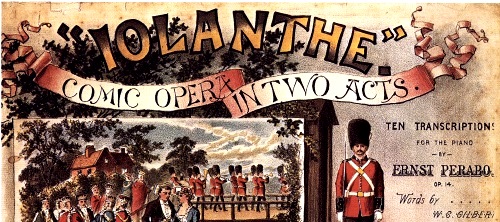
"Iolanthe" a ouvert au Savoy Theatre le 25 novembre 1882, trois soirs après la dernière représentation de "Patience" au même théâtre et est resté à l'affiche pour 398 représentations.
Gilbert avait déjà fait des coups de feu à l’aristocratie, mais dans ce "opéra de fées", la Chambre des Lords est ridiculisée comme un bastion de l’inefficace, privilégié et débile. Le système des partis politiques et d’autres institutions viennent aussi pour une dose de satire. Pourtant, à la fois auteur et compositeur a réussi à coucher la critique parmi ces rebondissements, aimables absurdités que tout est reçu comme bon amusement.
Gilbert et Sullivan étaient tous deux à l’apogée de leur créativité en 1882, et beaucoup de gens estiment qu’Iolanthe, leur septième collaboration, est la plus parfaite de leurs collaborations.
The opening night of Iolanthe was an occasion for what must have seemed a truly magical event in 1882. The Savoy Theatre was the first theatre in the world to be wired for electricity, and such stunning special effects as sparkling fairy wands were possible.
Gilbert had targeted the aristocracy for satiric treatment before, but in this "fairy opera", the House of Lords is lampooned as a bastion of the ineffective, privileged and dim-witted. The political party system and other institutions also come in for a dose of satire. Among many potshots that Gilbert takes at lawyers in this opera, the Lord Chancellor sings that he will "work on a new and original plan" that the rule (which holds true in other professions, such as the military, the church and even the stage) that diligence, honesty, honour, and merit should lead to promotion "might apply to the bar". Throughout Iolanthe, however, both author and composer managed to couch the criticism among such bouncy, amiable absurdities that it is all received as good humour. In fact, Gilbert later refused to allow quotes from the piece to be used as part of the campaign to diminish the powers of the House of Lords.
Although titled Iolanthe all along in Gilbert's plot book, for a time the piece was advertised as Perola and rehearsed under that name. According to an often-repeated fiction, Gilbert and Sullivan did not change the name to Iolanthe until just before the première. In fact, the title was advertised as Iolanthe as early as 13 November 1882 – eleven days before the opening – so the cast had at least that much time to learn the name. It is also clear that Sullivan's musical setting was written to match the cadence of the word "Iolanthe," and could only accommodate the word "Perola" by preceding it (awkwardly) with "O", "Come" or "Ah".
A glittering crowd attended the first night in London, including Captain (later Captain Sir) Eyre Massey Shaw, head of the Metropolitan Fire Brigade, whom the Fairy Queen apostrophizes in the second act ("Oh, Captain Shaw/Type of true love kept under/Could thy brigade with cold cascade/Quench my great love, I wonder?"). On the first night, Alice Barnett as the Fairy Queen sang the verses directly to the Captain, to the great delight of the audience.
L'intrigue se centre sur le personnage d'Iolanthe, une fée qui a été bannie du pays des fées parce qu'elle se marie avec un homme mortel, ce qui est interdit par la loi des fées. Son fils, Stréphon, est un pasteur arcadien qui veut se marier avec Phyllis, une pupille de la cour de la Chancellerie (Court of Chancery). Tous les membres de la chambre des Lords (House of Peers) veulent aussi se marier avec Phyllis. Quand Phyllis voit Strephon embrassant une jeune femme (ne sachant pas que c'est sa mère), elle se met en colère et crée une confrontation entre les pairs et les fées.
La pièce satirise beaucoup des aspects du gouvernement, de la loi et de la société de Grande-Bretagne.
Afficher le synopsis détaillé
Acte I
Twenty-five years prior to the beginning of the opera, Iolanthe, the mistress of fairy revels, who arranged all the fairy dances and songs, committed the capital crime (under fairy law) of marrying a mortal human. The Queen of the fairies commuted Iolanthe's sentence of death to banishment for life on the condition that Iolanthe left her husband and never communicated with him again. After the passage of 25 years, the fairies, still missing Iolanthe deeply, plead with the Queen to pardon Iolanthe and to restore her place in fairyland.
Summoned by the Fairy Queen, Iolanthe rises from the frog-infested stream that has been her home in exile. The Queen, unable to bear punishing her any longer, pardons Iolanthe, and she is warmly greeted by the other fairies. Iolanthe tells her sisters that she has a son, a half-fairy, half-human named Strephon ("He's a fairy down to the waist, but his legs are mortal"). The fairies laugh that Iolanthe appears too young to have a grown son, as one of the advantages of a fairy's immortality is that they never grow old. Strephon, a handsome Arcadian shepherd, arrives and meets his aunts. He tells Iolanthe joyously of his love for the Lord Chancellor's ward of court, the beautiful Phyllis. Phyllis does not know of Strephon's mixed origin. Strephon is despondent, however, as the Lord Chancellor has forbidden them to marry – partly because he feels that a shepherd is unsuitable for Phyllis, but partly because he wishes to marry Phyllis himself. In fact, so do half the members of the House of Lords. The Fairy Queen promises her assistance. Soon Phyllis arrives, and she and Strephon share a moment of tenderness as they plan their future and possible elopement.
A cadre of the peers of the realm arrive. They are all smitten with Phyllis, and they have appealed to the Lord Chancellor to decide who will have her hand. The Lord Chancellor is hesitant to act upon his own regard for Phyllis due to his position as her guardian. The Lords send for Phyllis to choose one of their number, but she declares that she won't marry any of them, as virtue is found only in a "lowly" cottage. The peers are unhappy at her rejection and beg her not to scorn them simply because their blood is excessively blue. Strephon approaches the Lord Chancellor, pleading that Nature bids him marry Phyllis. But the Lord Chancellor wryly notes that Strephon has not presented sufficient evidence that Nature has interested herself in the matter. He refuses his consent to the marriage between Strephon and Phyllis.
Disappointed, Strephon calls on Iolanthe for help. She appears and promises to support him in every way. Spying on the two, the peers – led by the brainless and stuffy Earls Tolloller and Mountararat – together with Phyllis, see Iolanthe and Strephon in a warm embrace. All three jump to the obvious conclusion, since the centuries-old Iolanthe appears to be a girl of seventeen. The peers scoff at the seemingly absurd claim that Iolanthe is Strephon's mother ("She is, has been, my mother from my birth"). Phyllis angrily rejects Strephon for his supposed infidelity and declares that she will marry either Lord Tolloller or Lord Mountararat ("...and I don't care which!"). Strephon at last calls for help from the fairies. They appear on cue, but are mistaken by the peers for a girls' school on an outing. Offended, the Fairy Queen pronounces a magical "sentence" upon the peers: Strephon shall not only become a Member of Parliament, but will have the power to pass any bill he proposes, including throwing the peerage open to competitive examination. The curtain closes with the fairies threatening the peers.
Acte II
The fairies have come to Westminster and tease the unhappy peers with the success and pronouncements of MP Strephon. As the Fairy Queen threatened in Act I, Strephon is advancing a bill to open the peerage to competitive examination. The peers ask the fairies to stop Strephon's mischief, stating that the House of Peers is not susceptible of any improvement. Although the fairies say that they cannot stop Strephon, they have become very much attracted to the peers, whom they find handsome and delightful. The fairy Queen is dismayed by this. Pointing to Private Willis of the First Grenadier Guards, who is the sentry on duty, the Queen claims that she is able to subdue her response to the effects of manly beauty.
Phyllis cannot decide which of the two selected peers, Tolloller or Mountararat, she ought to marry, and so she leaves the choice up to them. However, Tolloller tells Mountararat that his family's tradition would require the two Earls to duel to the death if the latter were to claim Phyllis. The two decide that their friendship is more important than love, and renounce their claims to her. Meanwhile, the Lord Chancellor has a nightmare due to his unrequited love for Phyllis.[4] The two peers try to cheer him up. At their urging, the Lord Chancellor determines to make another effort to convince himself to award Phyllis to himself.
Although Strephon now leads both parties in Parliament, he is miserable at losing Phyllis. Seeing Phyllis, he finally explains to her that his mother is a fairy, which accounts for a good many things! Phyllis and Strephon ask Iolanthe to go to the Lord Chancellor and plead for him to allow their marriage, for "none can resist your fairy eloquence." Impossible, she replies, for the Lord Chancellor is her husband. The Lord Chancellor believes Iolanthe to have died childless, and she is bound not to "undeceive" him, under penalty of death. However, to save Strephon from losing his love, Iolanthe decides to present his case to the Lord Chancellor in disguise.
Although the Lord Chancellor is visibly moved by her appeal, which evokes the memory of his lost wife, he declares that he himself will marry Phyllis. Dismayed, Iolanthe desperately unveils, despite the warnings of the unseen Fairies, revealing that she is his long-lost wife, and that Strephon is his son. The Lord Chancellor is amazed to see her alive, but Iolanthe has again broken fairy law, and the Fairy Queen is now left with no choice but to punish Iolanthe with death. As she prepares to execute Iolanthe, the Queen learns that the rest of the fairies have all now chosen husbands from among the peers, thus also incurring death sentences – but the Queen blanches at the prospect of slaughtering the whole company of fairies. The Lord Chancellor suggests a solution: change the law by inserting a single word: every fairy who "don't" marry a mortal shall die. The Fairy Queen cheerfully agrees and, to save her life, the dutiful soldier, Private Willis, agrees to marry her. Likewise, seeing no reason to stay in the mortal realm if peers are to be recruited from persons of intelligence, the peers agree to join the fairy ranks. They all sprout wings, and "away [they] go to fairyland."
• Overture
Act I
• 1. "Tripping hither, tripping thither" (Celia, Leila, and Chorus of Fairies)
• 2. "Iolanthe! From thy dark exile thou art summoned" (Queen, Iolanthe, Celia, Leila, and Chorus of Fairies)
• 3. "Good-morrow, good mother" (Strephon and Chorus of Fairies)
• 4. "Fare thee well, attractive stranger" (Queen and Chorus of Fairies)
• 4a. "Good-morrow, good lover" (Phyllis and Strephon)
• 5. "None shall part us from each other" (Phyllis and Strephon)
• 6. "Loudly let the trumpet bray" (Chorus of Peers)
• 7. "The law is the true embodiment" (Lord Chancellor and Chorus of Peers)
• 8. "My well-loved Lord" and Barcarole, "Of all the young ladies I know" (Phyllis, Lord Tolloller, and Lord Mountararat)
• 9. "Nay, tempt me not" (Phyllis)
• 10. "Spurn not the nobly born" (Lord Tolloller and Chorus of Peers)
• 11. "My lords, it may not be" (Phyllis, Lord Tolloller, Lord Mountararat, Strephon, Lord Chancellor, and Chorus of Peers)
• 12. "When I went to the Bar" (Lord Chancellor)
• 13. Finale Act I (Ensemble)
o "When darkly looms the day"
o "The lady of my love has caught me talking to another"
o "Go away, madam"
o "Henceforth Strephon, cast away"
o "With Strephon for your foe, no doubt / Young Strephon is the kind of lout"
Act II
• 14. "When all night long a chap remains" (Private Willis)
• 15. "Strephon's a member of Parliament" (Chorus of Fairies and Peers)
• 16. "When Britain really ruled the waves" (Lord Mountararat and Chorus)
• 17. "In vain to us you plead" (Leila, Celia, Chorus of Fairies, Mountararat, Tolloller, and Chorus of Peers)
• 18. "Oh, foolish fay" (Queen with Chorus of Fairies)
• 19. "Though p'r'aps I may incur thy blame" (Phyllis, Lord Mountararat, Lord Tolloller, and Private Willis)
• 20. "Love, unrequited, robs me of my rest" ... "When you're lying awake" (Lord Chancellor)
• 21. "If you go in you're sure to win" (Lord Tolloller, Lord Mountararat, and Lord Chancellor)
• 22. "If we're weak enough to tarry" (Phyllis and Strephon)
• 23. "My lord, a suppliant at your feet" (Iolanthe)
• 24. "It may not be" (Lord Chancellor, Iolanthe, and Chorus of Fairies)
• 25. "Soon as we may, off and away" (Ensemble)
The Lord Chancellor (comic baritone)
George, Earl of Mountararat (baritone)
Thomas, Earl Tolloller (tenor)
Private Willis, of the Grenadier Guards (bass)
Strephon, an Arcadian Shepherd (baritone)
Queen of the Fairies (contralto)
Iolanthe, a Fairy, Strephon's mother (mezzo-soprano)
Celia, a Fairy (soprano)
Leila, a Fairy (mezzo-soprano)
Fleta, a Fairy (speaking role/chorus)
Phyllis, an Arcadian Shepherdess and Ward in Chancery (soprano)
Chorus of Dukes, Marquises, Earls, Viscounts, Barons and Fairies
Aucun dossier informatif complémentaire concernant Iolanthe
Aucun dossier informatif complémentaire concernant Iolanthe
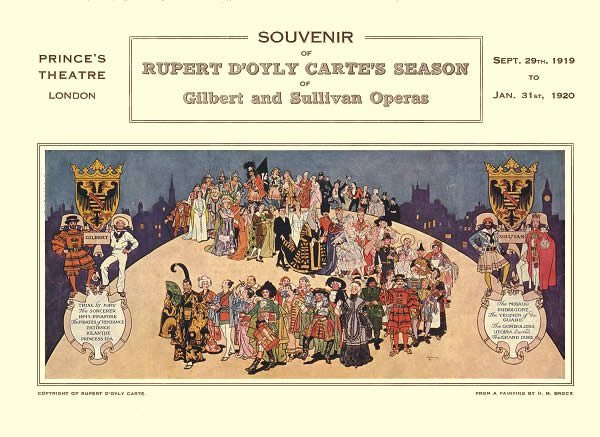
Version 1
Iolanthe (1919-09-Prince's Theatre-London) G&S Season
Type de série: RevivalThéâtre: Shaftesbury Theatre (Londres - Angleterre) Durée : 4 mois Nombre : Première Preview : 29 September 1919
Première: 29 September 1919
Dernière: 31 January 1920Mise en scène : Chorégraphie : Producteur : D'Oyly Carte Opera Company • Star(s) : Presse : "L'admirable compagnie se distingue par l'inclusion d'un nouveau ténor, M. Derek Oldham, dont la présence et les manières agréables, les capacités d'acteur et la voix exquise ravissent autant que celles de n'importe quel Marco que j'ai vu et entendu. Le duc de M. Henry Lytton, le Don Alhambra de M. Leo Sheffield et la duchesse de Miss Bertha Lewis sont tous en accord avec les traditions du pays, tandis que Miss Elsie Griffin et Miss Nellie Briercliffe formaient un couple d'épouses satisfaisant. L'enthousiasme du public était sans limite." - London Sunday Times
"Après quatre années de guerre et les misères qui en découlent, que se soucie le public britannique d'un inconvénient aussi insignifiant qu'une simple grève des chemins de fer ? Certainement pas assez pour se permettre d'être tenu à l'écart d'un événement aussi primordial que la reprise de Gilbert et Sullivan au Prince's Theatre, où un public immense était venu accueillir l'excellente compagnie de M. D'Oyly Carte lors de sa première visite au centre de Londres. C'était un public brillant et il comprenait non seulement de nombreuses personnalités sociales, théâtrales et musicales de l'époque, mais aussi un certain nombre de ces vieux Savoyards aux noms desquels les opéras de Gilbert et de Sullivan doivent toujours être irrévocablement associés. Miss Jessie Bond, Miss Geraldine Ulmar et M. Rutland Barrington étaient tous là." - Daily Telegraph
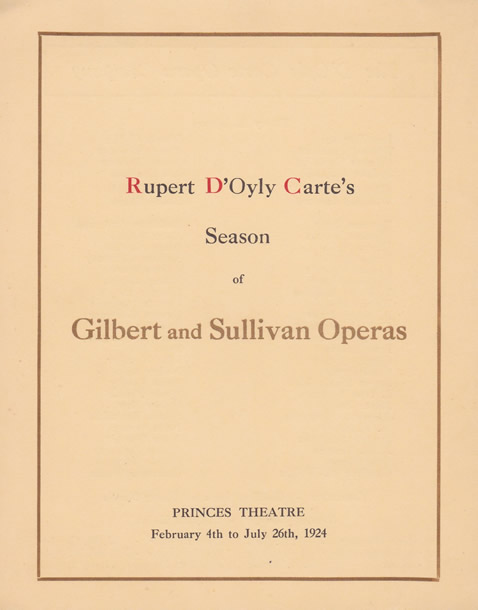
Version 2
Iolanthe (1924-02-Prince's Theatre-London) G&S Season
Type de série: RevivalThéâtre: Shaftesbury Theatre (Londres - Angleterre) Durée : 5 mois 3 semaines Nombre : Première Preview : 04 February 1924
Première: 04 February 1924
Dernière: 26 July 1924Mise en scène : Chorégraphie : Producteur : D'Oyly Carte Opera Company • Star(s) :
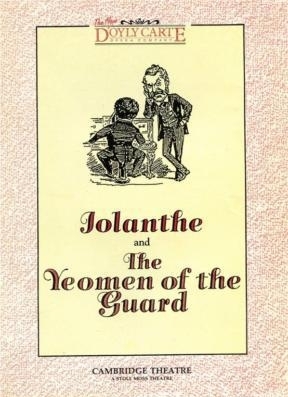
Version 3
Iolanthe (1988-07-Cambridge Theatre-London)
Type de série: RevivalThéâtre: Cambridge Theatre (Londres - Angleterre) Durée : 1 mois 3 semaines Nombre : Première Preview : Inconnu
Première: 12 July 1988
Dernière: 07 September 1988Mise en scène : Christopher Renshaw • Peter Walker • Chorégraphie : Producteur : Star(s) : Commentaires : The D’Oyly Carte Opera Company had lost its Arts Council funding and disbanded a few years earlier - an event described by many at the time as a great national loss. Following sponsorship from British Midland Airlines and a bequest from the late Bridget D’Oyly Carte, the New D’Oyly Carte Opera Company has been formed. With a 60-strong company and a 33 piece orchestra conducted by Bramwell Tovey, the new company has been managed by Richard Condon and thanks to the generosity of the Stoll Moss organisation has been able to re-launch itself with a season at the Cambridge Theatre. (The extended run of “Kiss Me Kate” at the Savoy meant they could not play their
original home)

Version 4
Iolanthe (2008-02-Gielgud Theatre-London)
Type de série: RevivalThéâtre: Gielgud Theatre (Londres - Angleterre) Durée : Nombre : Première Preview : 11 February 2008
Première: 11 February 2008
Dernière: 16 February 2008Mise en scène : Peter Mulloy • Chorégraphie : Peter Mulloy • Producteur : Star(s) : Avec: Steven Page (Lord Chancellor), Bruce Graham (Earl of Mountararat) , Barry Clark (Earl Tolloller ), Donald Maxwell/Gareth Jones (Stephon), Maria Ewing (Queen of the Fairies), Sophie-Louisa Dann (Iolanthe), Lesley Cox (Celia), Jane Quinn (Fleta), Charlotte Page (Phyllis)
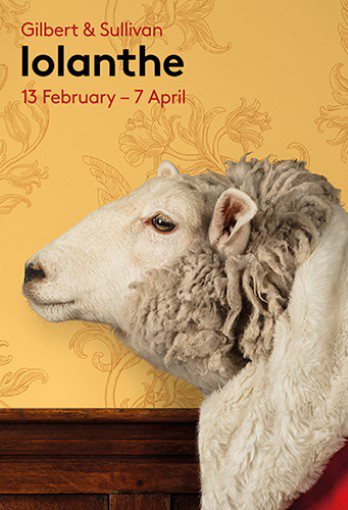
Version 5
Iolanthe (2018-02-Coliseum Theatre-London)
Type de série: RevivalThéâtre: Coliseum Theatre (Londres - Angleterre) Durée : 1 mois 3 semaines Nombre : Première Preview : 13 February 2018
Première: 13 February 2018
Dernière: 07 April 2018Mise en scène : Cal McCrystal • Chorégraphie : Producteur : Star(s) : Avec: Samantha Price, Ellie Laugharne, Yvonne Howard, Marcus FarnsworthCommentaires : Cal McCrystal (One Man, Two Guvnors) directs a production that embraces the chaotic physical comedy and irreverence that are his hallmarks. Outstanding young mezzo-soprano and ENO Harewood Artist Samantha Price leads a cast of ENO favourites, including Andrew Shore as the Lord Chancellor.Presse : ‘If you're not crying with laughter, visit your GP’ The Arts Desk
‘A grand and gorgeous extravaganza’ The Telegraph
‘An all-round, knockout success’ Financial Times
Pas encore de video disponible pour ce spectacle